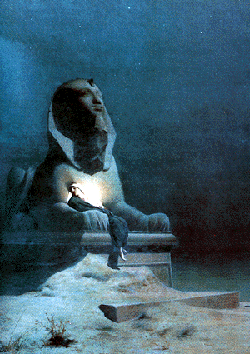Collision of Worlds
 As wrecks go, it was not all that spectacular: some broken glass on the roadway, a few police cars, their rooftop strobes painting the night walls of nearby buildings with surreal dancing figures of light, red and blue. The SUV sat on a flatbed, with little apparent damage; the less fortunate compact, compacted on the passenger side. No apparent injuries, no ambulance, no stretchers.
As wrecks go, it was not all that spectacular: some broken glass on the roadway, a few police cars, their rooftop strobes painting the night walls of nearby buildings with surreal dancing figures of light, red and blue. The SUV sat on a flatbed, with little apparent damage; the less fortunate compact, compacted on the passenger side. No apparent injuries, no ambulance, no stretchers.
The intersection–a T-bone emptying a side street into an urban arterial, controlled by a stoplight–was one I traveled often, almost daily. It was the insider’s way home–the city street longcut which circumvents the crush of rush-hour traffic, bypassing the freeway which costs time even on the best of days. Stopped at the light, I rubbernecked the scene, half-distracted by the mindless verbal patter of talk radio or some burned .mp3 I had heard too many times before. The mind wanders in such places, darting from thought to image, with no strong focus or overarching life crisis to rivet its attention. So the thought was odd, atypical, crisp in its clarity:
“Sometimes other accidents happen at accident scenes.”
The light turned green–my usual clue to pin the pedal and shorten my day by milliseconds while squandering a few extra ounces of too-costly petrol. But I paused: atypical. Was it the thought? Some other distraction? The fatigue of a day too long, the distracted weariness of a profession which sometimes bleeds your lifeblood like red pools on pavement? Who knows–how do you ever know?
My foot off the brake, not yet on the pedal, my car eased lightly into the now-allowed right-of-way. Retinal rods sensed motion without detail on the right–a car stopping at its just-red signal–or so it seemed at first.
He blew through the intersection–40, 45 my best guess–passing within inches of my front bumper. Never slowed, never braked, never aware that my car even existed. No surge of red from the tail lights, as they quickly faded down the dark arterial, undiminished and unaware.
The obligatory expletives rolled off my tongue, with far less fury than fear–it’s incongruous the bodily functions we sometimes call “holy.” The adrenaline leaves you shaken, and shaking, as the reality of what if sinks in.
“Sometimes other accidents happen at accident scenes.”
What is the nature of such intuition–a random thought presaging some disaster, a warning arising from–where? The depths of subconscious? Some long-forgotten experience, or story overheard? Perhaps a higher function of the brain, poorly developed and unrecognized, or some cosmic power, called “E.S.P.” or “paranormal” or “premonition” by those nearer to being charlatans than sages.
It may of course be any of these things, or several, or none: a random thought on a random corner, on a random night, near a random driver motoring recklessly. My sense, however–my conviction, even–is that it was something rather more–a collision, if you will, of two universes.
Such thoughts seem out of place–quaint even–in a technologically sophisticated culture where all that is known is that which is measured, where wisdom is weighed and parsed and packaged, and knowledge grows vaster about things ever more trivial. This vastness of knowledge has left us smaller people, living in a tightly constricted world, where joy and wonder have become the fodder of fools, displaced by cold cynicism and soulless skepticism. Ours is the triumph of gnosticism, the age of salvation through knowledge, fact trumping truth and science slaying the spirit. For in our great knowledge we have lost sight of that which is far vaster still, a universe unseen yet still experienced by many, a cosmos which impacts our lives moment by moment in ways both tiny and tectonic.
Ever since man looked upward at an incomprehensible sky, he has perceived the need for transcendence, to provide not only knowledge of the wonders beheld, but their meaning–to integrate that which is far larger, far deeper than himself into some sort of meaningful whole. Thus the history of man is the history of religion–a history with endless variations simple or sophisticated, from cave glyphs to gothic cathedrals, all pointing to something beyond man himself, whose very nature demands an explanation his nature alone cannot provide.
The fusion of these two worlds–material and spiritual–has had profound effects on human history in ways both great and small: from the lofty musical masterpieces of Bach and Handel, to the soaring architecture of the great cathedrals, to the preservation of ancient literature and culture by the monasteries, to the very roots of Western civilization, with its elevation of the individual and ideas of freedom and human rights, derived from Judeo-Christian insights on the nature of man and his relationship to God. And beyond these large and tangible mileposts lie countless lives transformed through the touch of spirit on hardened hearts, rippling through ages and cultures in ways almost imperceptible yet profound.
Yet Western civilization, so richly endowed with the gifts and benefits of its infusion of spiritual life and principles, has in an ironic twist taken one of these very gifts–the value of reason and logic and curiosity about the workings of a divinely-ordered creation, which gave rise to science–and used it as a wedge between the material and the spiritual. Western culture has bankrupted the very treasure from which its greatness arose, leaving an increasingly fragile shell of process without principles, institutions without inspiration, governance without grace. Steeped in knowledge yet long in shortcomings, our culture increasingly dismisses the spiritual and transcendent as but mere ignorance or malign superstition, and thus strangles its own lifeblood in its frantic rush to solve problems of the soul with the prescriptions of science and sociology. Our sickness is deep, and pervasive, and ultimately deadly–and made even more dangerous by our peculiar denial that there exists any sickness at all. Such malady takes many forms: from evangelistic secularism, seeking to purge all thought or mention of religion from our collective consciousness; to the intellectual miasma of postmodernism, where the only absolute truth is the denial of absolute truth; to the grand charade, where lust for power or corrupt materialism masquerade in the mantle of religious devotion or a gospel of social justice–which is neither just nor good for society; to the spirituality of the self, which seeks to find God within having denied Him without, and ends up worshiping only ego, in all its hideous manifestations.
There are, it is said, many roads to God–a cozy notion for the intellectually lazy and spiritually slothful, a passing nod to a past glory still spoken of but no longer believed. It is a bromide fast dissolving in a world where religious zealots praise Allah while slaughtering women and children; where men sing of Jesus while drinking poison Kool-Aid; where televised con-men fleece the faithful while preaching love and generosity; where men of the cloth speak of killing the elderly and suctioning the young with soothing words of “mercy” and “freedom” and “choice.” We are tossed like ships in a storm because we have lost both rudder and mast: the principles which have steered us, and the power which gives us purpose and direction, have been swept away in the rolling swells of material prosperity and the saturating rains of empty information and worthless knowledge.
It is time to do the hard work, the painful and unsettling job of foregoing easy assumptions and comfortable conclusions, to shine the harsh light of honesty and self-examination on our sated and sleepy souls. The easy road only leads downward, and we have followed it far too long. If all roads lead to God, then no road gets you there: you will spend an eternity seeking that which you do not wish to find.
I am a Christian; this is the road I have discovered, which has led me to God, which has allowed me to glimpse that universe which I understand little and conform to less. I make no apologies for my convictions, for I have found, by grace, a solid path which, while mysterious and tortuous and unpredictable, has proven real, and trustworthy, and tangible ways which only the intangible can be. As G.K. Chesterton said of his own journey into faith, the case for Christianity is rational–but it is not simple; it is an accumulation of countless facts all pointing in one direction. In the coming months, I hope to share something of my own journey into and through this faith. I do so, of course, in the hope that you too may also discover–or rediscover–its depth, and power, and integrity. But short of even this, may we begin to examine truth, and restore the principles, which alone may shine light on our ever-darkening age.
 In one of my early posts, I wrote an essay called
In one of my early posts, I wrote an essay called  The war rages on. It is a battle with ancient roots, deeply embedded in religion, culture, and the tensions between rich and poor. It is a war of contrasts: high technology and primitive cultural weapons; knowledge versus ignorance; speed and urgency against the methodical slowness of an enemy who knows time is on his side.
The war rages on. It is a battle with ancient roots, deeply embedded in religion, culture, and the tensions between rich and poor. It is a war of contrasts: high technology and primitive cultural weapons; knowledge versus ignorance; speed and urgency against the methodical slowness of an enemy who knows time is on his side.
 In the years following the Great War, a sense of doom and panic settled over Germany. Long concerned about a declining birth rate, the country faced the loss of 2 million of its fine young men in the war, the crushing burden of an economy devastated by war and the Great Depression, further compounded by the economic body blow of reparations and the loss of the German colonies imposed by the Treaty of Versailles. Many worried that the Nordic race itself was threatened with extinction.
In the years following the Great War, a sense of doom and panic settled over Germany. Long concerned about a declining birth rate, the country faced the loss of 2 million of its fine young men in the war, the crushing burden of an economy devastated by war and the Great Depression, further compounded by the economic body blow of reparations and the loss of the German colonies imposed by the Treaty of Versailles. Many worried that the Nordic race itself was threatened with extinction.
 Ron Suskind, in an article in the NY Times Magazine during the Bush vs. Gore election, Without a Doubt, addressed the issue of the faith of George W. Bush, and began as follows:
Ron Suskind, in an article in the NY Times Magazine during the Bush vs. Gore election, Without a Doubt, addressed the issue of the faith of George W. Bush, and began as follows:

 In contemporary political discourse, we often discuss the Rule of Law, especially in our postmodern culture where bad behavior is often justified (and excused) by situation, upbringing, or historical injustice. But no one ever talks about the Law of Rules.
In contemporary political discourse, we often discuss the Rule of Law, especially in our postmodern culture where bad behavior is often justified (and excused) by situation, upbringing, or historical injustice. But no one ever talks about the Law of Rules.